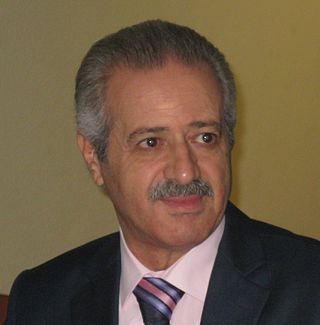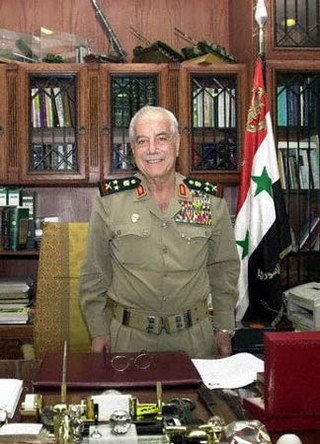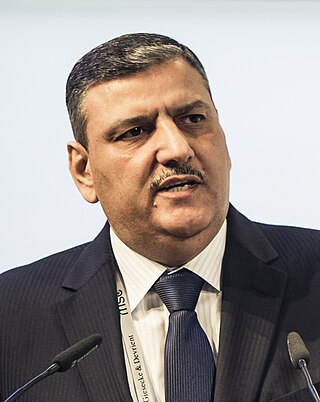
Muhammed Ahmed Faris is a Syrian military aviator. He was the first Syrian and the second Arab in space.

Mustafa Abdul Qadir Tlass was a Syrian senior military officer and politician who was Syria's minister of defense from 1972 to 2004. He was part of the four-member Regional Command during the Hafez Assad era.
Terrorism in Syria has a long history dating from the state-terrorism deployed by the Ba'athist government since its seizure of power through a violent coup in 1963. The Ba'athist government have since deployed various types of state terrorism; such as ethnic cleansing, forced deportations, massacres, summary executions, mass rapes and other forms of violence to maintain its totalitarian rule in Syria. The most extensive use of state terrorism in the 20th century was during 1970s and 1980s, when Islamic uprisings across Syria where crushed through bloody campaigns of intense repression, culminating in the Hama massacre which killed around 40,000 civilians.
The following is a timeline of the Syrian Civil War from May to August 2011, including the escalation of violence in many Syrian cities.

Riyad Farid Hijab is a Syrian politician. He was Prime Minister of Syria from June to August 2012, serving under President Bashar al-Assad. From 2011 to 2012, he was Minister of Agriculture.

The Free Syrian Army (FSA) is a big-tent coalition of decentralized resistance militias in the Syrian Civil War founded on 29 July 2011 by Colonel Riad al-Asaad and six officers who defected from the Syrian Armed Forces. The officers announced that the immediate priority of the Free Syrian Army is to safeguard the lives of protestors and civilians from the deadly crackdown by Bashar al-Assad's security apparatus; with the ultimate goal of accomplishing the objectives of the Syrian revolution, namely, the end to the decades-long reign of the ruling al-Assad family. In late 2011, the FSA was the main Syrian military defectors group. Initially a formal military organization at its founding, its original command structure dissipated by 2016, and the FSA identity has since been used by various Syrian opposition groups.
The following is a timeline of the Syrian uprising from September to December 2011. This period saw the uprising take on many of the characteristics of a civil war, according to several outside observers, including the United Nations Commission on Human Rights, as armed elements became better organized and began carrying out successful attacks in retaliation for the ongoing crackdown by the Syrian government on demonstrators and defectors.
Riad Mousa al-Asaad is a Syrian military commander, politician who is the founding leader of the Free Syrian Army. One of the prominent faces of the Syrian Revolution, he led the armed resistance to the Assad regime as commander-in-chief of FSA, during the early phase of the Syrian Civil War. Under Riad al-Asaad's command, FSA expanded into a para-military force of 75,000 guerillas and insurgents in March 2012; capable of ousting regime forces from Damascus. He currently serves as the Deputy Prime Minister for Military Affairs of the Syrian Salvation Government, a position he has held since 2 November 2017. He was a former Colonel in the Syrian Air Force who defected to the opposition in July 2011 and became the first Acting Commander-in-chief of the Free Syrian Army.
The Rif Dimashq clashes were a series of unrests and armed clashes in and around Damascus, the capital of Syria, from November 2011 until a stalemate in March 2012. The violence was part of the wider early insurgency phase of the Syrian civil war. Large pro-government and anti-government protests took place in the suburbs and center of Damascus, with the situation escalating when members of the Free Syrian Army (FSA) started attacking military targets in November.

The Syrian opposition is the political structure represented by the Syrian National Coalition and associated Syrian anti-Assad groups with certain territorial control as an alternative Syrian government.
The following is a timeline of the Syrian Civil War from January to April 2012, during which time the spate of protests that began in January 2011 lasted into another calendar year. An Arab League monitoring mission ended in failure as Syrian troops and anti-government militants continued to do battle across the country and the Syrian government prevented foreign observers from touring active battlefields, including besieged opposition strongholds. A United Nations-backed ceasefire brokered by special envoy Kofi Annan met a similar fate, with unarmed UN peacekeepers' movements tightly controlled by the government and fighting.
The following is a timeline of the Syrian Civil War from May to August 2012. The majority of death tolls reported for each day comes from the Local Coordination Committees, an opposition activist group based in Syria, and the Syrian Observatory for Human Rights, another opposition group based in London.
Hassan Hamada, full name Hassan Mirei al-Hamada, also spelled as Hammadeh, is a former colonel in the Syrian Air Force who, together with his MiG-21, defected to Jordan on 21 June 2012 during the Syrian civil war.
Manaf Tlass or Manaf Tlas is a former Brigadier General of the Syrian Republican Guard and member of Bashar al-Assad's inner circle who defected in 2012. He was the first Syrian Republican Guard commander to defect from the Syrian military and declare support for the opposition.
Firas Tlass is a Syrian businessman and a member of a significant Sunni family who had close relations with former Syrian President Hafez al-Assad, but defected to the rebels during the Syrian Civil War.

The Battle of Damascus, also known as Operation Damascus Volcano, started on 15 July 2012 during the Syrian civil war. It is unclear who started the battle. Thousands of rebels infiltrated Damascus from the surrounding countryside. Following this, according to some reports, the opposition forces launched an operation to capture the capital, while according to other reports, the military learned of the large-scale rebel operation beforehand and made a preemptive strike. Some reports even suggested the rebels launched the operation prematurely due to their plans being discovered by the security forces.
The 18 July 2012 Damascus bombing of the National Security headquarters in Rawda Square, Damascus, killed and injured a number of top military and security officials of the Syrian government. Among the dead were the Syrian Defense Minister and Deputy Defense Minister. The incident occurred during the Syrian Civil War, and is considered to be one of the most notorious events to affect the conflict. Syrian state-controlled television reported that it was a suicide attack while the opposition claims it was a remotely detonated bomb.
The following is a timeline of the Syrian Civil War from September to December 2012. Information about aggregated casualty counts is found at Casualties of the Syrian Civil War.

The Farouq Brigades, also spelt Farooq and Farook, was an armed rebel organisation formed by a number of Homs based members of the Free Syrian Army early in the Syrian Civil War. The group rapidly expanded in size and prominence in 2012, before suffering internal splits and battlefield reversals in 2013 that greatly reduced its influence. By 2014, the group was largely defunct, with member factions joining other rebel groups. The brigades were named Farouq after Omar bin al-Khattab, a Sahaba (companion) of the Islamic prophet Muhammad and the second Caliph.

The early insurgency phase of the Syrian civil war lasted from late July 2011 to April 2012, and was associated with the rise of armed oppositional militias across Syria and the beginning of armed rebellion against the authorities of the Syrian Arab Republic. Though armed insurrection incidents began as early as June 2011 when rebels killed 120–140 Syrian security personnel, the beginning of organized insurgency is typically marked by the formation of the Free Syrian Army (FSA) on 29 July 2011, when a group of defected officers declared the establishment of the first organized oppositional military force. Composed of defected Syrian Armed Forces personnel, the rebel army aimed to remove Bashar al-Assad and his government from power.







